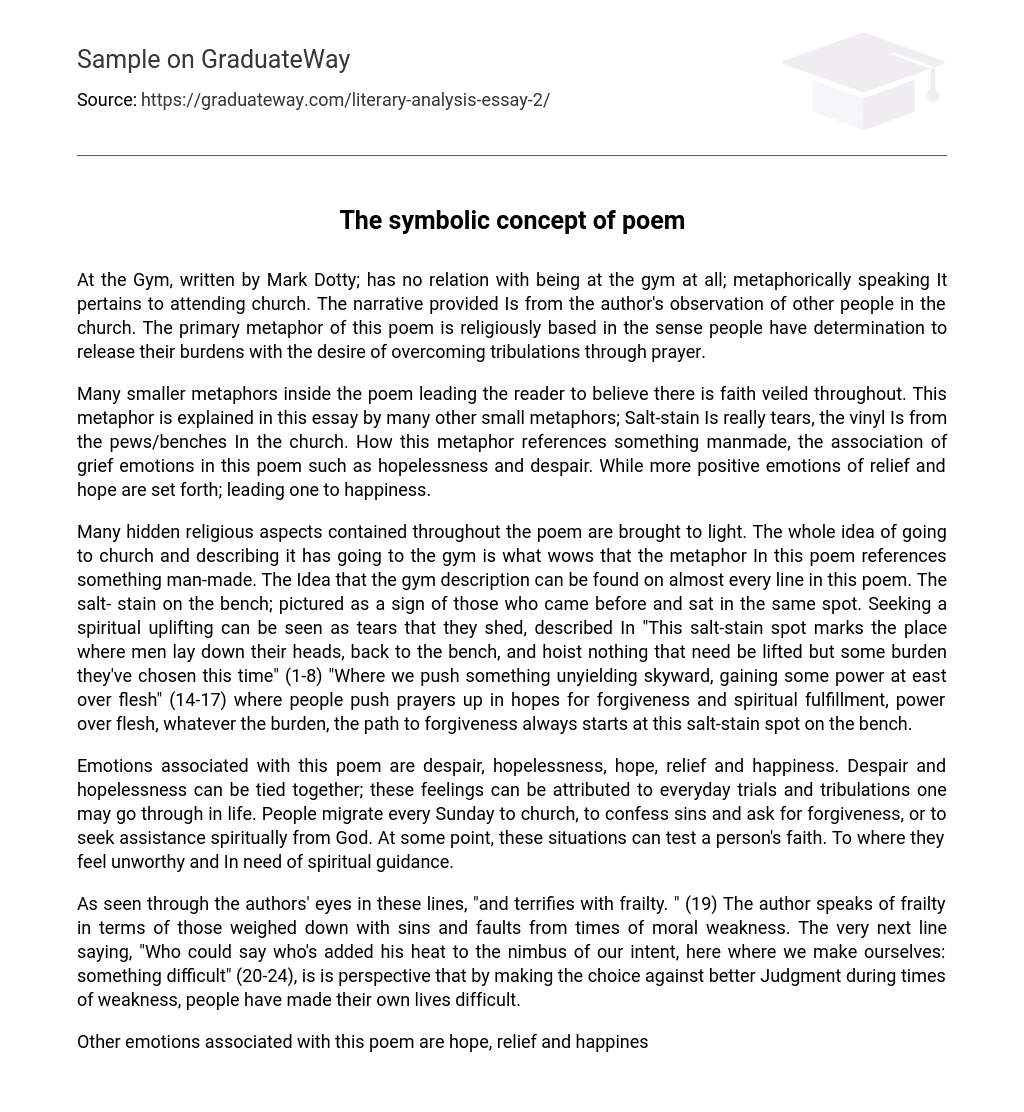At the Gym, written by Mark Dotty; has no relation with being at the gym at all; metaphorically speaking It pertains to attending church. The narrative provided Is from the author’s observation of other people in the church. The primary metaphor of this poem is religiously based in the sense people have determination to release their burdens with the desire of overcoming tribulations through prayer.
Many smaller metaphors inside the poem leading the reader to believe there is faith veiled throughout. This metaphor is explained in this essay by many other small metaphors; Salt-stain Is really tears, the vinyl Is from the pews/benches In the church. How this metaphor references something manmade, the association of grief emotions in this poem such as hopelessness and despair. While more positive emotions of relief and hope are set forth; leading one to happiness.
Many hidden religious aspects contained throughout the poem are brought to light. The whole idea of going to church and describing it has going to the gym is what wows that the metaphor In this poem references something man-made. The Idea that the gym description can be found on almost every line in this poem. The salt- stain on the bench; pictured as a sign of those who came before and sat in the same spot. Seeking a spiritual uplifting can be seen as tears that they shed, described In “This salt-stain spot marks the place where men lay down their heads, back to the bench, and hoist nothing that need be lifted but some burden they’ve chosen this time” (1-8) “Where we push something unyielding skyward, gaining some power at east over flesh” (14-17) where people push prayers up in hopes for forgiveness and spiritual fulfillment, power over flesh, whatever the burden, the path to forgiveness always starts at this salt-stain spot on the bench.
Emotions associated with this poem are despair, hopelessness, hope, relief and happiness. Despair and hopelessness can be tied together; these feelings can be attributed to everyday trials and tribulations one may go through in life. People migrate every Sunday to church, to confess sins and ask for forgiveness, or to seek assistance spiritually from God. At some point, these situations can test a person’s faith. To where they feel unworthy and In need of spiritual guidance.
As seen through the authors’ eyes in these lines, “and terrifies with frailty. ” (19) The author speaks of frailty in terms of those weighed down with sins and faults from times of moral weakness. The very next line saying, “Who could say who’s added his heat to the nimbus of our intent, here where we make ourselves: something difficult” (20-24), is is perspective that by making the choice against better Judgment during times of weakness, people have made their own lives difficult.
Other emotions associated with this poem are hope, relief and happiness, which can be felt as one enters the church and their burdens lighten while being surrounded by supportive church members and listening to the sermon. Spirits are lifted when one accepts the love and faith God provides; believing in the almighty “flashed onto the vinyl, where we push something, unyielding skyward, gaining some power, at least over flesh! 13-17) the meaning here is the indent left on the vinyl head rest from the outward force of sins flowing from the mind, to make room for the spiritual courage seeping in. “Though there’s something more tender, beneath our vanity, our will to become objects of desire” (28-31). The object of desire is not thought of as figures of lust, but that of a person who has achieved spiritual enlightenment. In church, speaking with the Lord leaves no room for appearance, it is the tenderness of souls and beliefs that are favored.
A person who in a true belief Tate, believes all good things happen through God, and nothing but great things await them in heaven. Mark Dotty uses the gym and the action of lifting weights as a burden someone has lifted through prayer at the church. This poem can be seen as having a religious concept, the lines “lay down their heads, back to the bench, and hoist nothing that need be lifted” (3-6). This can be viewed as one who is sitting in church with their heads bowed in prayer, their burden and spirits lifted though not related to actual weights being lifted.
People have burdens, whether or not brought on by themselves; they are there and need to be released. In church, people bring their burdens and sorrows, leaving them behind in the form of tears on the salt-stained bench. Mark Dotty expresses his perspective of people at the gym in the view of a person attending church, through witnessing their yearning to relieve hardships and gain spiritual growth. Whether it is to gain spiritual fulfillment, feel one with God, or simply receive forgiveness for their sins attending church suffices all needs.
The adaptor of this poem comes through as an individual releasing burden through prayer, proving to their selves that through God anything is possible, eternal life. “Here is some halo, the living made together. ” (33-34) In understanding how this metaphor is manmade, to include the emotional states of despair and liberation, the symbolic concept of this poem shines through. The gym is actually a church, the physical weights are emotional burdens needing to be released; the burdens are lifted through the bravery of prayer, leaving behind tears that dry to salt-stains on the vinyl.





